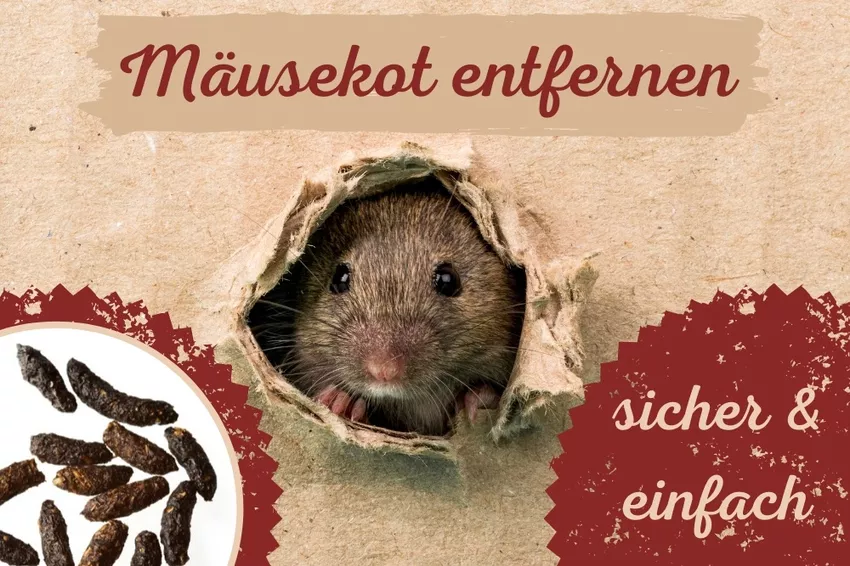- Ventilate thoroughly
- Put on protective equipment
- moisten feces
- Properly remove mouse droppings
- Thoroughly clean up
- prevent mouse droppings

Mouse droppings can make people sick because rodents are among the transmitters of hantavirus. In order not to contract the disease, you should take special precautions when carrying out cleaning work.
Ventilate thoroughly
Before you tackle mouse droppings in attics, basements or garden sheds, you should thoroughly air out such closed rooms. Open windows and doors for at least 30 minutes to create a draft. This means that any viruses and bacteria in the room air are transported outside. During ventilation, leave the room so as not to inhale dust particles.

Put on protective equipment
In order not to become infected with the hantavirus during cleaning work, which can be transmitted to humans through mouse droppings, you should avoid skin contact by wearing rubber gloves. Disposable gloves are completely sufficient and can then be disposed of. Protect your airways with a suitable mask while it fits snugly and prevents inhalation of fine dust. Hantaviruses can enter the body through the air we breathe. When buying a mask, use the values given as a guide:
- FFP1 protects against non-toxic and non-fibrogenic dusts
- FFP2 offers protection against harmful dust, smoke and aerosols
- FFP3 ideal for toxic dusts, enzymes and microorganisms such as viruses, bacteria or fungi
Notice: All of these fine dust masks trap particles up to a size of 0.6 µm in the fibres. FFP1 masks filter up to 80 percent of such particles, while FFP3 masks guarantee 99 percent protection.
moisten feces
The hantavirus can also survive for a long time on dried mouse droppings. In order to prevent the formation of dust and thus the spread of possible viruses in the room air, you should moisten the residues. Dust formation is particularly high during sweeping work and can therefore increase the risk of adverse health effects. Follow these steps:

- Pour water into a spray bottle
- add a few drops of disinfectant detergent
- shake vigorously to mix the product with the water
- Spray the solution gently onto the faeces
Properly remove mouse droppings
You should not remove mouse droppings with a vacuum cleaner, because viruses can be spread through the exhaust air in the room, especially with simple vacuum cleaners. If your vacuum cleaner has a HEPA filter, you can remove the residue without hesitation. Otherwise, simple utensils are sufficient:
- Sweep up moistened mouse droppings with a broom and shovel
- alternatively wipe up droppings with a strong kitchen towel
- Put waste in a plastic bag
- tie tightly and dispose of with household waste
Thoroughly clean up
After removing the residue, you should clean the area thoroughly to remove traces of urine. Use a sponge and clean the surface with a disinfectant. If the odor caused by urine has already penetrated deep into the ground, you should use this remedy:

- Sprinkle packet of baking soda or baking soda on the spot
- alternatively use cornstarch
- moisten with an atomizer
- Leave on for 24 hours
- Vacuum up powder crumbs
- wipe with a damp cloth
Notice: After cleaning, discard any used sponges or rags. Also think about thorough hand hygiene and washing your clothes after major cleaning work.
prevent mouse droppings
The best way to protect yourself from the hantavirus is to avoid mice in your home and garden. The bank vole is the main carrier of this pathogen. It prefers to live in deciduous and mixed forests, but also feels at home in gardens near the forest. In order not to attract the rodents, you should take the following precautions:

- Store food in an airtight container
- Seal waste well and store in garage or basement
- do not dispose of leftover food on the compost heap
- do not leave animal feed overnight
- close potential entry points
- Don't leave bulky waste standing for too long
- Eliminate shelter and nesting opportunities